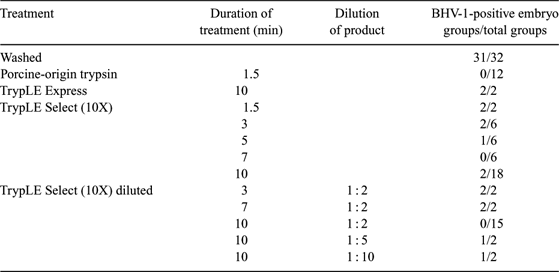238 EFFICACY OF RECOMBINANT TRYPSIN AGAINST BOVINE HERPESVIRUS-1 ASSOCIATED WITH IN VITRO-DERIVED PORCINE EMBRYOS
M. S. D. Marley A , M. D. Givens A , P. K. Galik A , K. P. Riddell A and D. A. Stringfellow AACollege of Veterinary Medicine, Auburn University, Auburn, AL 36849, USA
Reproduction, Fertility and Development 19(1) 234-235 https://doi.org/10.1071/RDv19n1Ab238
Submitted: 12 October 2006 Accepted: 12 October 2006 Published: 12 December 2006
Abstract
TrypLETM (Invitrogen, Carlsbad, CA, USA) is a recombinant, fungal, trypsin-like protease that is used as a substitute for porcine-origin trypsin in cell culture procedures. It is stable at room temperature and does not present the same risk of contamination as animal-origin trypsin. Previously, TrypLE SelectTM (10X) was shown to remove bovine herpesvirus-1 (BHV-1) from Day 7 in vivo-derived embryos (Marley et al. 2006 Reprod. Fert. Dev. 18, 213–214). The objective of this study was to determine if the same treatment would effectively remove BHV-1 from Day 7 zona pellucida-intact, in vitro-derived porcine embryos. Day 7 in vitro-derived morulae and blastocysts and non-fertile or degenerate embryos (NFD) were washed according to the International Embryo Transfer Society protocol. One group of 10 NFD was not exposed to virus and served as the negative control. The remaining embryos and 10 NFD were exposed to 106–108 PFU/mL BHV-1 (Colorado strain) for 1 h. Following exposure, one group of 10 NFD was washed and served as the positive control. The remaining developed embryos were divided into groups of 10 and washed and treated as described in Table 1. Following treatment, the embryos were sonicated in groups of 5 and assayed by virus isolation. The negative control embryos, as well as the embryos treated with porcine-origin trypsin, TrypLE Select (10X) for 7 min, and TrypLE Select (10X) diluted 1 : 2 for 10 min, were negative for virus. The positive control embryos in addition to the other treatments were positive on virus isolation (Table 1). Although, TrypLE Select (10X) does have some antiviral effect when used for 10 min, it was not completely effective, as shown by the positive virus isolation results of one group of 10 embryos. The groups treated with TrypLE Select (10X) diluted 1 : 2 for 10 min were negative for virus; however, if a larger sample size had been tested, positive groups might have occurred. Though using a recombinant trypsin product would be beneficial over using an animal-origin product, it is not known if TrypLE Select (10X) would render a single IVF embryo free of infectious virus. Further research would also need to be performed to assess the viability of embryos following treatment with TrypLE Select (10X). In addition, other recombinant trypsin products need to be evaluated to determine their efficacy against BHV-1 associated with IVF embryos.

|


